3 April 2017 Edition
The ‘Dirty War’ in Ireland
Britain still a state in denial
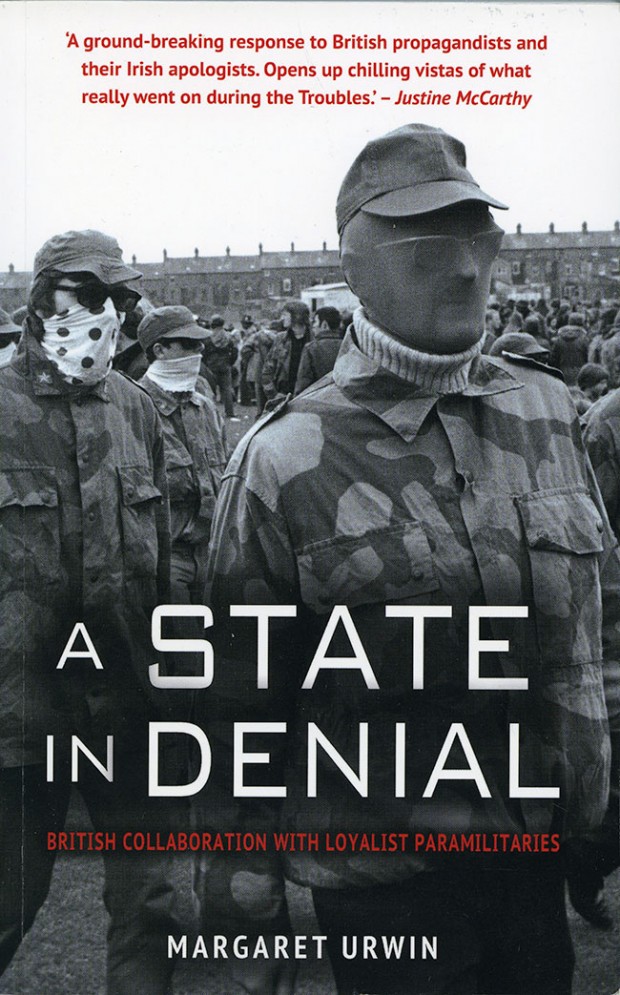
“The British Government have continually failed to live up to their responsibilities as co-guarantors of the Good Friday Agreement. They have pandered to unionism time and time again, and they have shown and demonstrated a one-sided approach when it comes to the issues of legacy.” – Michelle O’Neill
AS the McGurk’s Bar Massacre families continue their quest for justice from the Ulster Volunteer Force bomb attack of 4 December 1971 that left 15 civilians dead, Margaret Urwin from campaign group Justice for the Forgotten has uncovered more evidence confirming that senior British and unionist politicians as well as top British Army and RUC police officers endorsed a campaign of disinformation aimed at falsely blaming the IRA for the unionist attack on the Catholic-owned pub in north Belfast, writes PEADAR WHELAN.
The evidence was included in legal documents sent by the British Government to the Dublin Government and used in its defence against accusations of torture against ‘The Hooded Men’ during hearings in the European Court of Human Rights and as justification for not interning loyalists without trial.
The document records that a claim by a loyalist group calling themselves “Empire Loyalists” was dismissed and maintains that the bombers’ intended target was a hotel. Campaigners have uncovered numerous documents proving a campaign of disinformation but this is the first time a hotel has been cited as the target for the bomb.
The electoral shockwave in the North’s Assembly election swept away the unionist majority at Stormont for the first time in history. Amidst the consequent talks geared towards re-establishing the Executive, what is taxing the minds of many republicans is the attitude of the British Government to the legacy issue encompassing collusion, the refusal to fund inquests, shoot-to-kill operations by state forces, and Westminster’s rush to protect from any investigation of British soldiers responsible for killings in the North. Senior members of the British Government – including Prime Minister Theresa May – and Fleet Street newspapers have accused those demanding inquiries of being involved in a “witch-hunt”.
In the talks, Sinn Féin’s leader in the North, Michelle O’Neill, marked British Government Secretary of State James Brokenshire’s cards by telling him the party does not regard him or his government as neutral.
Brokenshire’s “one-sided partisan view means he cannot be an honest-broker in negotiations”, Michelle O’Neill said.
“The British Government have continually failed to live up to their responsibilities as co-guarantors of the Good Friday Agreement. They have pandered to unionism time and time again, and they have shown and demonstrated a one-sided approach when it comes to the issues of legacy.”
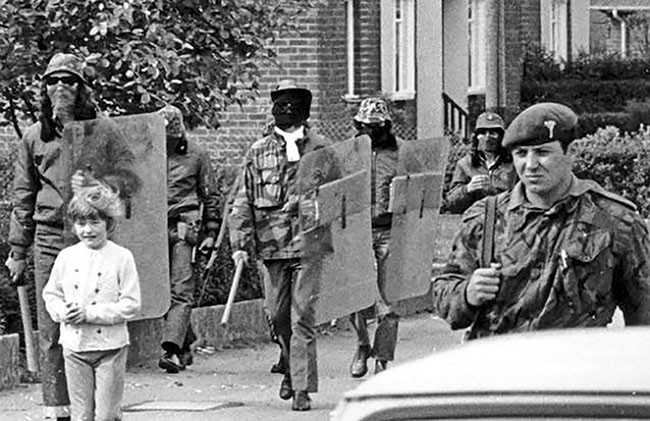
• Masked UDA members patrol alongside British soldiers – General Tuzo was happy to allow the loyalist gangs operate
The British Government, faced with a dilemma over how to deal with a political crisis in the North, is floundering, particularly because this Tory Government, fighting battles on multiple fronts, doesn’t know which way to turn.
The results of March’s Assembly election have put a Border poll firmly on the agenda. The North’s majority “Remain” vote in the Brexit referendum and calls led by Sinn Féin for “Special Designated Status in the EU” for the North have many people looking afresh at not just the prospects and challenges of a united Ireland but the opportunities.
Added to Britain’s woes are Fianna Fáil’s pledge to publish a 12-point plan “within months” as part of a plan for a united Ireland and Taoiseach and Fine Gael leader Enda Kenny acknowledging the citizenship of the people in the North with his referendum on voting rights for the Irish Diaspora, including those living in the North.
Meanwhile, Theresa May is still floundering over Brexit despite announcing the ‘trigger date’ for Brexit as 29 March and struggling to fend off Scotland First Minister Nicola Sturgeon’s demand for a second Scottish independence referendum.
Now the British are keen to keep their legacy issues off the agenda. These go right to the heart of their war in Ireland, exposing the myth of ‘neutrality’ and the colonial policies from which flowed from direct military repression, collusion, shoot-to-kill and the deployment of secret British Army hit squads such as the undercover Military Reaction Force.
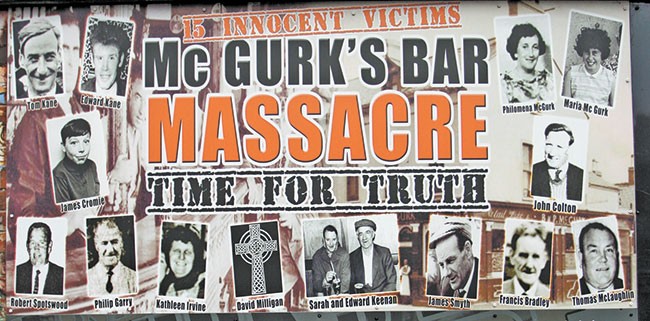
• McGurk’s Bar Massacre 1971 – The quest for the truth continues
Westminster against investigations of its 'Operation Banner'
WITH DERRY CITY on a knife edge as “The Battle of the Bogside” raged and Belfast was shrouded in the black acrid smoke rising from the homes of thousands of nationalists torched by the state’s Royal Ulster Constabulary police force and loyalist mobs, the Westminster Government of Harold Wilson ordered British troops onto the streets of the North.
His decision was the clearest admission from Britain, in the aftermath of partition, that the Six Counties was a failed political entity.
From day one, the British recognised, quicker than most people, that they were dealing with a situation that had more to do with their colonial rule in Ireland over centuries and not just the ‘law and order’ problem they projected to the world at large.
Their counter-insurgency instincts kicked in right away and this is evidenced in the fact that many of their most senior commanders and career soldiers deployed to the North in that critical period between 1970 and 1972 were involved in counter-insurgency across the globe in the Empire’s colonies as their peoples demanded freedom.
The most senior military commanders (General Officer Commanding) Sir Ian Freeland and General Harry Tuzo were veterans of counter-insurgency in Cyprus and Borneo.
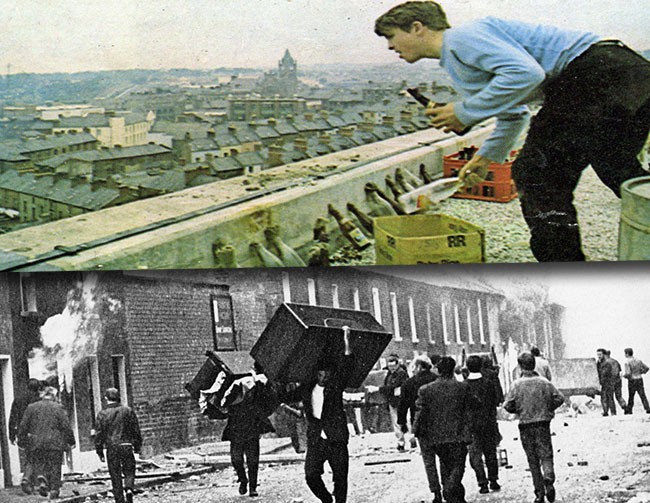
• Battle of the Bogside in Derry and Belfast homes burned in unionist pogroms
The “Commander of Land Forces” in 1971/72, Major-General Robert Ford, had soldiered in Palestine and Aden while his predecessor, Major-General Anthony Farrar-Hockley, was a seasoned campaigner with service in Palestine, Cyprus, Aden and in covert operations in Indonesia.
Not surprisingly, in this constellation of enforcers of colonial rule, the name of Brigadier Frank Kitson looms large.
General Sir Michael Jackson of the Parachute Regiment, who by the end of his career had risen to hold the top rank in the British Army, played a crucial role in disseminating misinformation about the Civil Rights marchers shot dead by the British Army on Bloody Sunday in what infamously became known as the “shot list”. He described Kitson as an “incisive thinker and military theorist”, claiming that “he was the sun around which the planets revolved . . . and very much set the tone for the operational style” in Belfast.
If, as Jackson maintains, Kitson “set the tone” it is in her book A State in Denial: British Collaboration With Loyalist Paramilitaries that Margaret Urwin explores and exposes what she describes as “the tangled web of relationships between British Government ministers, senior civil servants and senior police and military officers with loyalists paramilitaries in both the Ulster Defence Association and the Ulster Volunteer Force”.
She says of Kitson “having introduced counter-insurgency methods in a number of colonial campaigns – Malaya, Muscat, Oman, Cyprus and Kenya – Kitson was posted to Northern Ireland in 1970. He soon set about introducing these in his new posting by establishing plainclothes soldiers in covert units which evolved into the Military Reaction Force and encouraging the use of ‘proxy’ or supporting forces (loyalist deaths squads) and local friendly forces employed throughout the colonies by the British Army.”
This strategy was the accepted policy and Margaret Urwin goes into great detail in revealing how it played itself out on the streets.
In her painstakingly thorough analysis of official British Government documents, Margaret Urwin essentially proves that the two largest loyalist death squads, the UDA and UVF, were allowed to carry on their campaign against the nationalist population.
A huge element of “plausible deniability” was attached to the attitude of the British and the unionist government at the time as the revitalised UVF and the newly-formed UDA were given free rein to carry out killings and intimidation, mostly against the nationalist population.
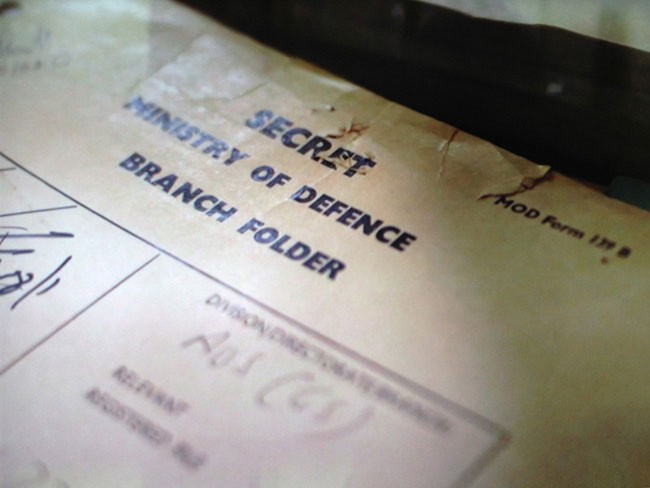
She cites, in particular, the rationale of General Harry Tuzo’s thinking when, as GOC, he suggested that the UDA be allowed to build barricades to “defend” unionist areas and that it “was arguable that Protestant areas could be almost entirely secured by a combination of UDA, Orange Volunteers [loyalist paramilitary group] and RUC”.
In fact, Tuzo believed it necessary to “turn a blind eye to UDA arms when confined to their own areas”.
When Tuzo made these comments in 1972, the UDA had already killed 18 people, four of whom were abducted at UDA barricades, taken away and assassinated.
Taken in the round, Tuzo’s thinking, underpinned by Kitson’s strategies, tell us that the British were operating an integrated politico-military strategy in the North and that the unionist death squads were a key element of it.
Therefore, investigations into collusion such as that of Urwin and Anne Cadwallader for her book Lethal Allies: British Collusion in Ireland leads us down a path that takes us to the door of the British Government at Westminster in London.
What lurks behind that door is Prime Minister Theresa May and her right-wing Tory Government that is determined to exonerate Britain’s armed forces and security agencies of any wrongdoing in the North.
As the puppet to a rabid right-wing Tory establishment puppetmaster, May has revealed her colours when, according to the unionist daily the News Letter of 15 March, the British Prime Minister wrote to “Northern Ireland veterans” telling them “the whole [my emphasis] system of addressing the past” is “unbalanced”.
Her Northern echo chamber, Secretary of State James Brokenshire, parroting unionists, is on record as saying that legacy investigations are “not working . . . and we are in danger of seeing the past rewritten". He emphasised his government and judiciary “do not unfairly treat soldiers and police officers”.
The real campaign here for the British state is the fight to protect its unionist narrative of the conflict as the legitimate one and any opposing (i.e. nationalist) perspective is given short shrift and no legitimacy.
The contents of Theresa May’s letter were reported on the day that British Royal Marine Commando Sergeant Alexander Blackman had a murder conviction for summarily executing a wounded Taliban insurgent overturned and reduced to manslaughter on the grounds of diminished responsibility.
It was a sign, if one were needed, of how the British Establishment reacts to protect itself. It is a protection they want to extend to those British soldiers responsible for killing civilians in the North and thereby the state’s narrative of the conflict to the exclusion of all else.
It is truly a state in denial.
• A State in Denial: British Collaboration with Loyalist Paramilitaries, by Margaret Urwin, Mercier Press.




